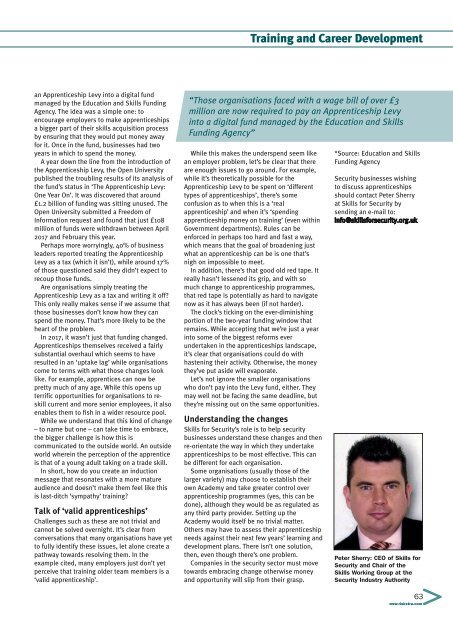RiskXtraDecember2018
You also want an ePaper? Increase the reach of your titles
YUMPU automatically turns print PDFs into web optimized ePapers that Google loves.
Training and Career Development<br />
an Apprenticeship Levy into a digital fund<br />
managed by the Education and Skills Funding<br />
Agency. The idea was a simple one: to<br />
encourage employers to make apprenticeships<br />
a bigger part of their skills acquisition process<br />
by ensuring that they would put money away<br />
for it. Once in the fund, businesses had two<br />
years in which to spend the money.<br />
A year down the line from the introduction of<br />
the Apprenticeship Levy, the Open University<br />
published the troubling results of its analysis of<br />
the fund’s status in ‘The Apprenticeship Levy:<br />
One Year On’. It was discovered that around<br />
£1.2 billion of funding was sitting unused. The<br />
Open University submitted a Freedom of<br />
Information request and found that just £108<br />
million of funds were withdrawn between April<br />
2017 and February this year.<br />
Perhaps more worryingly, 40% of business<br />
leaders reported treating the Apprenticeship<br />
Levy as a tax (which it isn’t), while around 17%<br />
of those questioned said they didn’t expect to<br />
recoup those funds.<br />
Are organisations simply treating the<br />
Apprenticeship Levy as a tax and writing it off?<br />
This only really makes sense if we assume that<br />
those businesses don’t know how they can<br />
spend the money. That’s more likely to be the<br />
heart of the problem.<br />
In 2017, it wasn’t just that funding changed.<br />
Apprenticeships themselves received a fairly<br />
substantial overhaul which seems to have<br />
resulted in an ‘uptake lag’ while organisations<br />
come to terms with what those changes look<br />
like. For example, apprentices can now be<br />
pretty much of any age. While this opens up<br />
terrific opportunities for organisations to reskill<br />
current and more senior employees, it also<br />
enables them to fish in a wider resource pool.<br />
While we understand that this kind of change<br />
– to name but one – can take time to embrace,<br />
the bigger challenge is how this is<br />
communicated to the outside world. An outside<br />
world wherein the perception of the apprentice<br />
is that of a young adult taking on a trade skill.<br />
In short, how do you create an induction<br />
message that resonates with a more mature<br />
audience and doesn’t make them feel like this<br />
is last-ditch ‘sympathy’ training?<br />
Talk of ‘valid apprenticeships’<br />
Challenges such as these are not trivial and<br />
cannot be solved overnight. It’s clear from<br />
conversations that many organisations have yet<br />
to fully identify these issues, let alone create a<br />
pathway towards resolving them. In the<br />
example cited, many employers just don’t yet<br />
perceive that training older team members is a<br />
‘valid apprenticeship’.<br />
“Those organisations faced with a wage bill of over £3<br />
million are now required to pay an Apprenticeship Levy<br />
into a digital fund managed by the Education and Skills<br />
Funding Agency”<br />
While this makes the underspend seem like<br />
an employer problem, let’s be clear that there<br />
are enough issues to go around. For example,<br />
while it’s theoretically possible for the<br />
Apprenticeship Levy to be spent on ‘different<br />
types of apprenticeships’, there’s some<br />
confusion as to when this is a ‘real<br />
apprenticeship’ and when it’s ‘spending<br />
apprenticeship money on training’ (even within<br />
Government departments). Rules can be<br />
enforced in perhaps too hard and fast a way,<br />
which means that the goal of broadening just<br />
what an apprenticeship can be is one that’s<br />
nigh on impossible to meet.<br />
In addition, there’s that good old red tape. It<br />
really hasn’t lessened its grip, and with so<br />
much change to apprenticeship programmes,<br />
that red tape is potentially as hard to navigate<br />
now as it has always been (if not harder).<br />
The clock’s ticking on the ever-diminishing<br />
portion of the two-year funding window that<br />
remains. While accepting that we’re just a year<br />
into some of the biggest reforms ever<br />
undertaken in the apprenticeships landscape,<br />
it’s clear that organisations could do with<br />
hastening their activity. Otherwise, the money<br />
they’ve put aside will evaporate.<br />
Let’s not ignore the smaller organisations<br />
who don’t pay into the Levy fund, either. They<br />
may well not be facing the same deadline, but<br />
they’re missing out on the same opportunities.<br />
Understanding the changes<br />
Skills for Security’s role is to help security<br />
businesses understand these changes and then<br />
re-orientate the way in which they undertake<br />
apprenticeships to be most effective. This can<br />
be different for each organisation.<br />
Some organisations (usually those of the<br />
larger variety) may choose to establish their<br />
own Academy and take greater control over<br />
apprenticeship programmes (yes, this can be<br />
done), although they would be as regulated as<br />
any third party provider. Setting up the<br />
Academy would itself be no trivial matter.<br />
Others may have to assess their apprenticeship<br />
needs against their next few years’ learning and<br />
development plans. There isn’t one solution,<br />
then, even though there’s one problem.<br />
Companies in the security sector must move<br />
towards embracing change otherwise money<br />
and opportunity will slip from their grasp.<br />
*Source: Education and Skills<br />
Funding Agency<br />
Security businesses wishing<br />
to discuss apprenticeships<br />
should contact Peter Sherry<br />
at Skills for Security by<br />
sending an e-mail to:<br />
info@skillsforsecurity.org.uk<br />
Peter Sherry: CEO of Skills for<br />
Security and Chair of the<br />
Skills Working Group at the<br />
Security Industry Authority<br />
63<br />
www.riskxtra.com>

















